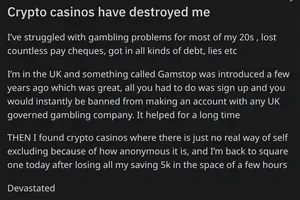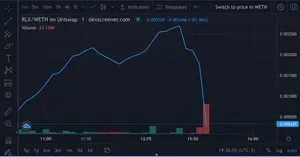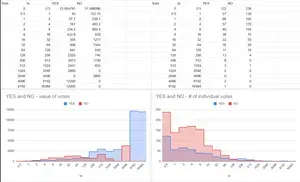Regardless of whether they are trying to use blocking software or not, some people in the subreddit appear to be struggling with the challenges presented to them by cryptocurrencies. Some speak about gambling in cryptocurrency casinos, while others have realized that the behaviors that many people involved with cryptocurrencies simply refer to as "investing" are actually manifestations of their gambling addiction. One poster wrote, "Realised yesterday whilst out walking my dog that i'd used crypto as a way to satisfy my gambling urges. I've self excluded from gambling sites for a few years now and managed to taper off. Crypto pulled me back in with trading. I was lying to myself that I was 'investing' so its fine which eventually turned into 24/7 chart watching and leverage trades."
About 30 posts in a subreddit about gambling addiction mention crypto in the month of January
The World Wildlife Fund announces their upcoming NFT project... for nature!
This was not the WWF's first foray into NFTs — the German arm of the WWF released a "Non-Fungible Animals" NFT project in November 2021, which has enjoyed less than $10,000 in trading volume. It also did't appear to be the only project the WWF UK had planned — their NFT website advertised upcoming collaborations with CyberKongz (built on the Ethereum blockchain) and World of Women (also built on the Ethereum blockchain).
Realux, a project promising to "democratize" and "resolve the wealth gap" in real estate, rug pulls $23,000 only hours after launch
After backlash, Troy Baker announces he will no longer be partnering with the "voice NFT" project Voiceverse
All "iloveponzi"'s apes gone! Veteran hacker makes $700,000 stealing and flipping big name NFTs
Tax season begins to hit crypto Reddit hard
Questions like "How can crypto be a viable currency if every transaction is taxed?" are beginning to pop up as well, and more than a few commenters have described their plans to not report any of their crypto activity — certainly a wise thing to be discussing on a public Internet forum.
Streamer Ice Poseidon admits to scamming his followers out of $500,000 with his "Cxcoin" made for streamers
On January 31, 2022, a YouTuber named Coffeezilla released a video in which he confronted Denino about his actions and urged him to return the money to his fans who'd bought in on the project. Denino replied, "I could give the money back, it is within my power, but I am going to look out for myself and not do that." According to Coffeezilla, Denino took a total of $200,000 from the token's presale, $250,000 that was earmarked for marketing, and $300,000 from the liquidity pool. In the end, Denino pocketed around $300,000 and his developers took around $200,000. After realizing that Coffeezilla would be releasing the interview, Denino promised to "use the buyback function to put 155k into the liquidity" — which turned out to mean 155,000 BNB rather than dollars, roughly equivalent to around $40,000.
- "This Famous Livestreamer Stole $500,000 From His Fans", video by Coffeezilla
- Tweet by coffeebreak_YT
Someone starts selling colors on the blockchain, because why the hell not I guess
Qubit continues to try to tempt the attackers who stole $80 million to return it, with increasingly-desperate messages
Wonderland protocol founder writes that the "Wonderland experiment is coming to an end", despite vote ongoing and majority of participants voting to continue
By raw numbers it appeared most investors opposed the idea, as many will receive miniscule amounts compared to their initial investments. However, the larger holders (most of whom bought in at low prices) stand to make money from the liquidation and some have supported winding down. Because the DAO voting operates in a plutocratic model, where people can vote based on how many tokens they hold, at one point votes from a relatively small number of whales were trending the vote towards supporting winding down even though 90% of individuals wanted the project to continue. The votes to continue had begun to beat out the votes to wind down when Daniele Sestagalli announced on Twitter on January 30, before the vote's scheduled end, that the "Wonderland experiment is coming to an end."
Ultimately, Sestagalli ended up respecting the wishes of the community, who decided to continue the project despite having lost 90% of their money, presumably in hopes of regaining some of the losses.
- "Wonderland votes out QuadrigaCX co-founder Sifu and is considering shutting down", The Block
- "Wind down Wonderland, and give the treasury back to its holders?" vote on Snapshot
- "ELI5 - Explain to me like I'm 5" - The consequences of WIP #4" post on r/WonderlandTIME
- "What is really happening with the vote" post on r/WonderlandTIME
- Tweet by danielesesta








